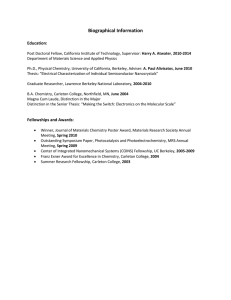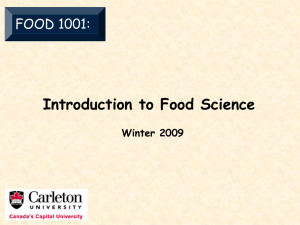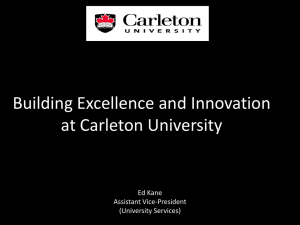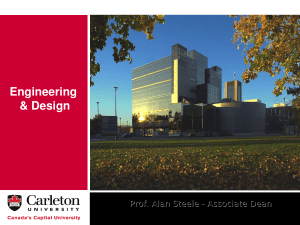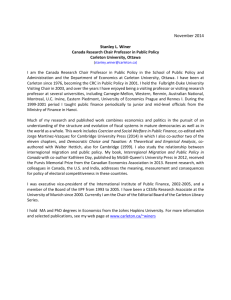carleton.ca Food Science and Nutrition
advertisement
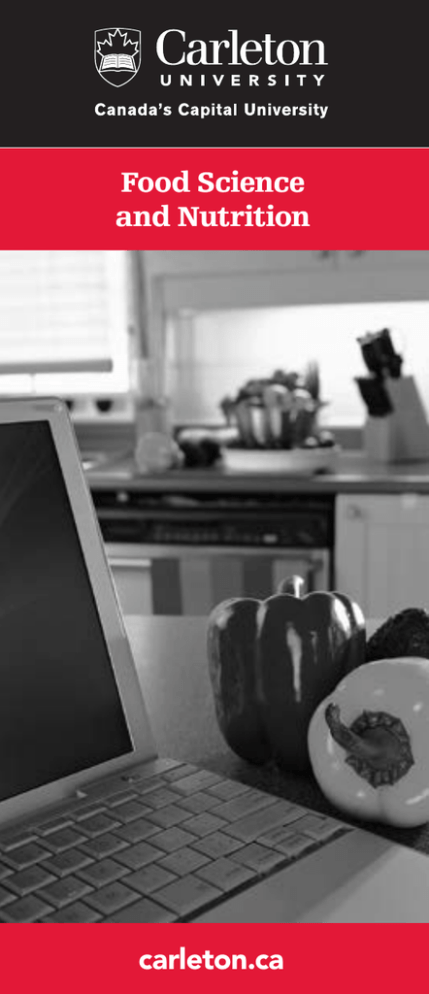
Food Science and Nutrition carleton.ca The production and distribution of food is one of the most important economic activities in the world. The health and welfare of people everywhere depend on the effective processing, storage and handling of food. The field of food science integrates and applies knowledge from the disciplines of chemistry, biology, biochemistry, economics and nutrition to preserve, process, package and distribute foods that are nutritious, affordable, desirable and safe to eat. It includes areas such as food manufacturing (from product development to packaging); food composition (food chemistry); food additives (vitamins, preservatives, colour, flavour); stability (shelf life, microbiology); food safety (contaminants, food poisoning); and the sensory properties of food (taste, appearance, smell, texture). In Canada, the food industry employs approximately 288,000 people and accounts for 12 per cent of total employment in manufacturing in the country. Food scientists contribute their expertise to improve quality and quantity of food produced and to respond to issues such as irradiation of foods, genetically modified foods, food contamination and preservation. The Carleton advantage Food Science and Nutrition at Carleton University is distinct from other university-level food science programs in the country. The Carleton program provides a solid science base in chemistry, biology and biochemistry with a strong emphasis on assessment, management and communication of risk in food safety. As a graduate of the program, you will not only be a skilled and knowledgeable scientist, you will also have the ability to assess risk and formulate policy. No other program in Canada offers this unique blend of science, economics, risk assessment and regulation. Hands-on experience At Carleton, we believe you should gain real-life experience as soon as possible. That’s why you will be taking experimental lab courses beginning in your first year. It is also why we provide a number of other valuable hands-on opportunities, such as summer internships and co-operative education possibilities to all our Science students. The capital advantage Carleton’s location in Ottawa, the nation’s capital, means that our programs and professors have strong links with government labs such as Health Canada, Agriculture and Agri-Food Canada, and the Canadian Food Inspection Agency, as well as the National Research Council of Canada. Laura Dusmet de Smours, Food Science and Nutrition student The Food Science and Nutrition program at Carleton has allowed me to become more aware of what I eat, what I do and, how it affects my day-today life. I thought I was a healthy eater before, but now I see where I can improve in my diet and find my perfect nutrient consumption match. My classes are fascinating and engaging, and they allow me to answer my own questions based on the knowledge that I am accumulating. My professors are also able to answer my questions very thoroughly, to a point that I crave to know more about the subject. I am just so thrilled to be here in this program! The program Bachelor of Science (Honours) Carleton’s Food Science and Nutrition program is a four-year Honours Bachelor of Science degree program. Course overview In your first year, you will be introduced to relevant subjects, including biology, chemistry, mathematics and economics. An introductory course in food science provides an overview of the food industry (including production, processing, product development, packaging, chemistry, analysis and microbiology), as well as elements of risk assessment, policy formation and regulation. Upper-year courses In your second year, you will probe the sciences in more depth, with courses in cell physiology and biochemistry, genetics and organic chemistry. A Principles of Nutrition (FOOD 2001) course allows you to gain an understanding of digestion, absorption and metabolism of nutrients. You will also examine disorders such as diabetes and cardiovascular disease. In the third year of the program, you will specialize more fully in the food sciences, with courses in food chemistry, analysis, packaging, engineering and microbiology. Courses in economics and statistical modelling round out your studies. In your final year, you will study food quality control, risk assessment and toxicology. You will also have the opportunity to undertake a major research project in food science. Working with one of your professors on a specialized topic, you will complete experimental work to support a thesis on a subject of interest. Your first-year experience A sample first year ■■ ■■ ■■ ■■ ■■ ■■ ■■ ■■ 0.5 credit in Introduction to Food Science 0.5 credit in Introductory Biology I 0.5 credit in Introductory Biology II 1.0 credit in General Chemistry I) and General Chemistry II 0.5 credit in Elementary Calculus I 0.5 credit in Linear Algebra I 1.0 credit in Introduction to Economics 0.5 credit from Physics or Earth Sciences Minor Students registered in other programs who are interested in food science can now take a 4.0 credit minor in Food Science and Nutrition. A minor will give you a foundation in another area of study and will appear as a notation on your diploma. Future opportunities The workplace There is a demand in Canada for food science graduates with a wide range of knowledge of the entire food production continuum, as well as regulatory and policy-making expertise. Graduates of the program will be eligible for membership in the Canadian Institute of Food Science and Technology and will be well qualified to work for the federal government and other agencies, as well as in industry and research. Careers in the food science and nutrition sectors include positions as quality assurance managers, consumer product officers, food technologists and food safety specialists, to name but a few. Graduate studies Many Carleton Honours students pursue graduate studies either in Canada or abroad. Our undergraduate programs are excellent preparation for master’s and doctoral programs. Professional programs Many professional programs, including teaching, medicine, business and law, encourage well-rounded applicants from a variety of backgrounds to apply. An Honours Bachelor of Science degree provides a strong foundation for such training. FAQs 1. When do I have to declare a major? You will need to choose a major by the end of your first year. Course registration is generally easier for students who have declared a major, so even if you are not 100 per cent certain, it is best to choose a major upfront and change it later if you need to. 2. Where can I go for academic advice? In addition to academic advising within the Department of Chemistry, our Student Academic Success Centre offers a range of services including academic advising and free study-skill development workshops. carleton.ca/sasc You can also take advantage of our new Science Student Success Centre, which was created specifically to address the needs of science students. Admission requirements For admission to the Food Science and Nutrition program, you must have the Ontario Secondary School Diploma (OSSD) or equivalent, including a minimum of six 4 U/M courses. These six courses must include Advanced Functions and two of Biology, Chemistry, Earth and Space Science, or Physics. (Calculus and Vectors is also strongly recommended.) It is Carleton University policy to consider your best performance in any eligible course in the admissions assessment. Since the number of qualified applicants may be greater than the number of available spaces, cut-off averages and required marks may vary. Please refer to our website at admissions.carleton.ca/ requirements for current admission requirements. For more information …about the Food Science and Nutrition program at Carleton, please visit our website at carleton.ca/fsn or consult the Carleton University Undergraduate Calendar at carleton.ca/cuuc. SCIENCE Do you want more information? Please contact us at: Department of Chemistry Carleton University 203 Steacie Building 1125 Colonel By Drive Ottawa ON K1S 5B6 Canada Tel:613-520-3534 Fax:613-520-3749 Email: chemistry@carleton.ca Website: carleton.ca/fsn Undergraduate Recruitment Office Carleton University 315 Robertson Hall 1125 Colonel By Drive Ottawa ON K1S 5B6 Canada Tel: 613-520-3663 Toll-free in Canada: 1-888-354-4414 Fax: 613-520-3847 Email: liaison@carleton.ca Website: carleton.ca/admissions This document is available in a variety of accessible formats upon request. A request can be made on the Carleton University website at: carleton.ca/accessibility/request. Click for more information you might be interested in: Produced by Creative Services and printed by Graphic Services 319-13 2M 01 2014
